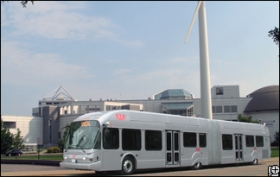Hydrogen Fuel Made Using Green Energy
In what may be the ultimate bid for clean energy, a NASA-backed group is
designing a wind- and sun-powered fueling system for city buses -- and
possibly other machines -- that run on hydrogen.
The demonstration is intended to not only showcase a fuel with zero carbon
emissions, but to produce the hydrogen in similar fashion.

The project, spearheaded by NASA's Glenn Research Center in Cleveland, Ohio, would use power produced by a windmill and solar energy cells to run a machine called an electrolyzer that splits water molecules into its base elements of hydrogen and oxygen. The hydrogen, in turn, would be used as fuel for specially-equipped buses.
"What we're proposing is to give a full-scale demonstration of taking renewable energy off of a wind machine or photovoltaic grid, using that energy to power a water electrolyzer to break down water into hydrogen and oxygen and then use that hydrogen as a fuel in a fuel cell-powered vehicle," Paul Prokopius, an energy consultant and retired NASA fuel cell researcher, told Discovery News.
Prokopius is working with 13 agencies and businesses to parlay $310,000 in seed money into state and federal economic stimulus grants to cover the project's $6 million to $10 million cost.
The group hopes to have the system in place by next May when a prototype hydrogen fuel cell bus, built by United Technologies, is scheduled to become available for demonstration projects.
"We promised them we would have a hydrogen station for them to use to run that bus," Prokopius said. "It's going to be a full-size transit bus that will operate just like the rest of the regional transit agency's buses in the city."
The only visible difference between the hydrogen-powered bus and those running on gasoline is a little bit of water coming out of the tailpipe.
"They produce water vapor and clean water -- nothing else. It's totally zero emission," Prokopius said.
The station would be built at the Great Lakes Science Center, located in downtown Cleveland on the shore of Lake Erie. The center already has a windmill and solar energy grid that is used for educational purposes and to produce electricity for the museum. Water for the hydrogen fuel would come straight out of Lake Erie.
"The idea is that you'd stimulate jobs for the community by folks learning how to build these devices, how to operate them and also what you could use hydrogen for," said Valerie Lyons, a program manger at NASA Glenn. "Maybe people would make forklifts and other small vehicles that run off hydrogen, or convert gasoline-powered cars.
"There's a lot of things that could simulate the economy with different types of jobs spinning off from the hydrogen economy."